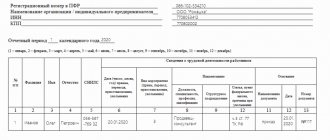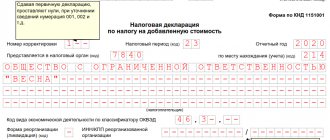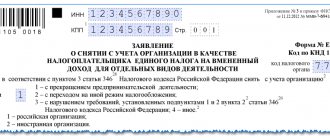What is the Unified Federal Register of Information on the Activity of Legal Entities?
The Unified Federal Register of Information on the Facts of the Activities of Legal Entities (hereinafter referred to as the EFRSFYUL) is a federal information resource that contains legally significant information about the facts of the activities of legal entities, individual entrepreneurs and other economic entities (for example, the value of the net assets of a joint-stock company or the pledge of movable property by a legal entity property).
Some of the information in the EFRSFYUL is entered by the registration authority (for example, on the creation of a legal entity), and some - by the legal entity itself (for example, on obtaining a license).
Who maintains the Register?
The Ministry of Economic Development of Russia is an authorized federal executive body that adopts regulations aimed at implementing the provisions on the Unified Federal Register of information on the facts of the activities of legal entities (hereinafter referred to as the Register, EFRS). The procedure for maintaining the EFRS is determined by the Order of the Ministry of Economic Development dated April 5, 2013. The operator of the Register (the legal entity that will carry out its formation and maintenance) is CJSC Interfax. The cost of posting information by an organization through this operator is 640 rubles (including VAT) per message.
Guidelines for entering information into the Register of information on the facts of activities of legal entities (ER)
The instructions have been prepared in response to numerous requests from colleagues. We provided a full description of the situation with entering information into the EDF earlier here.
It should be noted: we have the opinion that the requirement to mandatory enter information about SRO membership in the EDF is clearly an excessive measure. We believe that there is a contradiction with the current legislation, in particular with the Law “On the organization of the provision of state and municipal services” dated July 27, 2010 N 210-FZ (current edition, 2016)
Article 7. Requirements for interaction with the applicant when providing state and municipal services 1. Bodies providing public services and bodies providing municipal services do not have the right to demand from the applicant: 2) submission of documents and information, including confirming payment by the applicant for payment provision of state and municipal services that are at the disposal of bodies providing public services, bodies providing municipal services, other state bodies, local government bodies or organizations subordinate to state bodies or local government bodies participating in the provision of those provided for in Part 1 of Article 1 of this Federal Law state and municipal services, in accordance with regulatory legal acts of the Russian Federation, regulatory legal acts of constituent entities of the Russian Federation, municipal legal acts, with the exception of documents included in the list of documents specified in part 6 of this article. The applicant has the right to submit the specified documents and information to bodies providing public services and bodies providing municipal services on his own initiative;
Information about CI's membership in the SRO is contained in the state information resource - the Register of Cadastral Engineers!
This position was reflected in the resolution of the 5th All-Russian Congress of Cadastral Engineers - Excerpt from the project:
Reflect the disagreement of the cadastral community with the obligation to enter information into the EDF for members of the SRO. Prepare a justification and submit an initiative to the Ministry of Economy to abolish this norm.
The problem is that the norm has already come into force and today there will be less recommendations in the spirit of “don’t introduce it - everything is on the norm”!
Login to the resource of the federal register of legally significant information about the facts of the activities of legal entities, individual entrepreneurs and other economic entities
Creating an individual entrepreneur card
Create a message
Invoice creation and payment
Message text
I ask you to enter into the Unified Federal Register of legally significant information about the facts of the activities of legal entities, individual entrepreneurs and other economic entities, information about my membership in a self-regulatory organization (hereinafter referred to as SRO), indicating the following information: 1. Last name, first name, patronymic: Brui Vitaly Olegovich 2. Insurance number of an individual personal account (SNILS): 051-849-155-68 3. INN: 611320857705 4. Contact address for contacting a member of the SRO: 347709, Rostov region, Kagalnitsky district, Kirovskaya village , st. Olimpiyskaya, 10, apt. 2 5. Name of SRO: Self-regulatory organization Union “Non-Profit Association of Cadastral Engineers”; (short name: Union “Cadastral Engineers”) 6. INN SRO: 6455065718 7. OGRN SRO: 1166451055781 8. Type of activity that can be carried out in connection with membership in such an SRO: Cadastral activity, all-Russian code of economic activity (OKVED) - 71.12 .7
After paying the invoice, the entry is added to the EDF.
Who is the registry operator
The EFRS was created in order to collect all information about legal entities and the facts of their activities, which legal entities are required to publish. The register itself is posted on the Internet and is publicly available to any interested parties. The EFRS is formed and managed by an operator appointed by the responsible government body - the Ministry of Economic Development of Russia.
The operator has not yet been confirmed. But the legislator made a reservation: before the approval of the EFRS operator, its functions must be performed by the operator of another register - the Unified Federal Register of Bankruptcy Information (EFRSOB). Strictly speaking, the EFRSOB should become an integral part of the EFRS.
By Order of the Ministry of Economic Development dated March 21, 2011 No. 121, Interfax CJSC was appointed operator of the EFRSOB. It currently performs the functions of the EFRS operator.
A year and a half was not enough to create and approve regulatory documents for the new register. The draft order of the Ministry of Economic Development “On approval of the Procedure for the formation and maintenance of the EFRS and the EFRSOB” is still under consideration. But the Ministry of Economic Development must also approve the deadline and price for posting information in the EFRS, and the type of electronic signature used to enter this information. However, the register has been created and is already functioning at https://fedresurs.ru.
Who reports net assets?
All joint stock companies are OJSC and CJSC, as well as LLC. However, LLCs must provide information on net assets only in cases provided for by Federal Law No. 14-FZ dated 02/08/98 “On Limited Liability Companies” (hereinafter referred to as Law No. 14-FZ).
What are these cases? Alas, there is no direct answer to the question in which cases LLCs must submit information about net assets to the EFRS in Law No. 14-FZ. Paragraph 2 of Article 49 of this law establishes the obligation of an LLC to annually publish annual accounting reports, as well as disclose other information about its activities, in the event of a public placement of bonds and other issue-grade securities by this LLC. Article 30 of Law No. 14-FZ states that the annual report must contain a section on the state of net assets. In addition, the company is obliged to provide any interested party with access to information about the value of its net assets.
From this we can conclude that it is mandatory to publish in the EFRS information on the value of net assets for those LLCs that publicly place bonds and other equity securities. At least, we were unable to find any other reason for publishing such information for an LLC in this law.
We conclude: information on the value of net assets is submitted to the EFRS by all joint-stock companies (open and closed), as well as those LLCs that publicly place bonds and other equity securities.
What threatens those who do not submit information?
What responsibility occurs if an organization ignores the requirements of the law to enter information into the EFRS? There are two norms of the Code of Administrative Offenses of the Russian Federation, which, in my opinion, can be used in the event of failure to provide information to the EFRS or untimely submission of this information.
Firstly, this is Article 14.25 of the Code of Administrative Offenses of the Russian Federation “Violation of the legislation on state registration of legal entities and individual entrepreneurs.” It names four offenses. However, the provisions of the first and second parts of this article directly relate to the actions of officials and do not threaten organizations in any way. Therefore, let us immediately turn to the third and fourth parts of Article 14.25 of the Code of Administrative Offenses of the Russian Federation:
3) failure to submit, untimely submission or submission of false information about a legal entity or an individual entrepreneur to the body carrying out state registration of legal entities and individual entrepreneurs, in cases where such provision is provided for by law;
4) submission to the body carrying out state registration of legal entities and individual entrepreneurs of documents containing knowingly false information.
For these violations, officials face a fine of 5 thousand rubles or disqualification for up to 3 years.
However, we see that the cited norms deal only with those documents and information that organizations must submit to the tax office, as the body carrying out state registration. The information we are talking about is submitted to a completely different body. So Article 14.25 of the Administrative Code of the Russian Federation in its current edition is unlikely to be applied. Although at any time amendments may be made to the Code of Administrative Offenses of the Russian Federation or an explanation will be issued by the Supreme Arbitration or Constitutional Court. But for now we will proceed from what we have.
Secondly, this is part 2 of Article 15.19 of the Code of Administrative Offenses of the Russian Federation “Violation of legal requirements relating to the presentation and disclosure of information on financial markets.” The offense here is related to failure to disclose information or violation by the issuer of the procedure and deadlines for disclosure of information provided for by federal laws, including disclosure of information not in full, as well as unreliable or misleading information.
For legal entities, the fine for this violation ranges from 700 thousand rubles to 1 million rubles.
In accordance with paragraph 1 of Article 30 of Law No. 39-FZ “On the Securities Market”, information disclosure is a procedure that guarantees the finding and receipt of information. This law does not directly say that any specific information needs to be placed specifically in the EFRS. However, if there is a desire, the regulatory authorities may well build a logical chain linking the presentation of information on net assets to the EFRS and part 2 of Article 15.19 of the Code of Administrative Offenses of the Russian Federation.
But, I repeat, this concerns only information about the value of net assets and threatens only issuers of securities. That is, all OJSC and CJSC, as well as those LLCs that placed bonds.
Conclusion: at present there are no rules that would directly establish liability for failure to provide information on the value of net assets to the EFRS. However, there is some probability of application of Part 2 of Article 15.19 of the Code of Administrative Offenses of the Russian Federation.
What information must be entered into the EFRS and who should do it?
In accordance with paragraph 7 of Article 7.1 of Law No. 129-FZ, the following information must be entered into the EFRS: a) a record of the creation of a legal entity (including the creation of a legal entity through reorganization); b) a record that the legal entity is in the process of reorganization; c) a record that the legal entity is in the process of liquidation; d) a decision on the upcoming exclusion of a legal entity from the Unified State Register of Legal Entities; e) a record of the exclusion of a legal entity from the Unified State Register of Legal Entities; f) a record of the termination of a unitary enterprise, the property complex of which was sold through privatization or made as a contribution to the authorized capital of the OJSC; g) a record of a decrease or increase in the authorized capital; h) a record of the appointment or termination of powers of the sole executive body of a legal entity; i) a record of a change in the address (location) of a legal entity.
This block of information, fortunately, is entered into the EFRS not by the legal entity itself, but by the body that registers legal entities, that is, tax authorities. Inspectors are required to transfer the specified information to the Unified State Register of Legal Entities within five days after entering the same information into the Unified State Register of Legal Entities. It seems that all information about legal entities as of January 1, 2013 has already been entered into the new register. But, I repeat, this is information provided by tax officials.
But the information listed below is provided by the legal entities themselves. Let's continue reading their list: j) information on the value of the net assets of the joint-stock company as of the last reporting date; k) information on the value of the LLC’s net assets, in cases provided for by the Federal Law “On Limited Liability Companies”; l) information on obtaining a license, suspension, renewal of a license, re-issuance of a license, cancellation of a license or termination for other reasons of a license to carry out a specific type of activity; m) information about the arbitration court’s ruling on the introduction of surveillance; o) information the entry of which is provided for by other federal laws; p) other information that a legal entity enters at its own discretion, with the exception of information to which access is limited in accordance with the legislation of the Russian Federation.
As you can see, the list is extensive and affects a very wide range of legal entities. They must enter information about the facts of their activities into the EFRS within three working days from the date of occurrence of the relevant fact.
Let's talk in more detail about some of this information, and, more precisely, about who should provide it to the EFRS and when.
Background
On January 1, 2013, a new article 7.1 of the Federal Law of 08.08.01 No. 129-FZ “On State Registration of Legal Entities and Individual Entrepreneurs” (hereinafter referred to as Law No. 129-FZ) came into force. This article obliges legal entities to enter information about certain facts into the “Unified Federal Register of Information on the Facts of the Activities of Legal Entities.”
Joint-stock companies are now experiencing a state of “déjà vu”: only a year has passed since OJSC and CJSC were released from the quarterly obligation to report the value of net assets to the Unified State Register of Legal Entities, when the obligation to submit this information was again introduced, but in the new federal register, and even for money! But let's talk about everything in order.
First, let's agree on terms. More precisely about the name of the new registry. EFRSOFYUL - this is an abbreviation made up of the first letters. It's not very convenient to pronounce. On the website of the new register, this abbreviation is shortened to four letters, and it turns out quite acceptable - EFRS. Time will tell what short name will stick, but for now I will call the register with this short combination of letters - EFRS.
The commented article 7.1 of Law No. 129-FZ was published thanks to the Federal Law of July 18, 2011 No. 228-FZ. Legislators set aside a year and a half to create a new registry and approve the necessary by-laws and message formats. Therefore, media reports about the new responsibility of organizations that should appear in the future sounded rather sluggish. We wrote about this in the review comment “What will change in 2012: taxes, insurance premiums, accounting.”
Of course, then another change in Law No. 129-FZ on state registration of legal entities was more relevant. It was introduced by the same Law of July 18, 2011 No. 228-FZ, but came into force on January 1, 2012. Then, the net assets of joint stock companies were removed from the list of information included in the Unified State Register of Legal Entities. This meant that the obligation of OJSCs and CJSCs to submit quarterly application R14001, reporting to the Unified State Register of Legal Entities the value of net assets as of the next reporting date. Joint-stock companies had a rest throughout 2012, and now they will again submit information on net assets.
However, it is noteworthy that the EFRS will have to provide a much larger volume of information. Let's figure out in order who should notify this new registry, and why, in fact, it is needed.
Net assets of insurers, issuers and persons subject to statutory audit
To answer the question asked above, you should pay attention to the information letter of the Ministry of Finance of Russia dated December 4, 2012 No. PZ-10/2012. In it, the Ministry of Finance reminds of at least two cases when legal norms require the preparation of interim financial statements.
Firstly, in accordance with the Law of the Russian Federation dated November 27, 1992 No. 4015-1 “On the organization of insurance business in the Russian Federation,” quarterly financial statements are submitted by the subject of the insurance business to the insurance supervisory authority.
However, the interim accounting (financial) statements of insurance organizations consist of the “Balance Sheet of the Insurer” (Form No. 1-Insurer) and the “Profit and Loss Statement of the Insurer” (Form No. 2-Insurer).
The value of net assets is indicated only in the “Report on changes in the insurer’s capital” (Form No. 3-insurer), which is included only in the annual reporting (clause 4 of the “Instructions on the procedure for compiling and submitting accounting (financial) statements of insurers”, approved by order of the Ministry of Finance Russia dated July 27, 2012 No. 109n).
Secondly, disclosure of the quarterly financial statements of the issuer of securities is required by Federal Law dated April 22, 1996 No. 39-FZ “On the Securities Market”. But even here, interim financial statements are subject to disclosure, which do not contain information on the value of net assets.
There is one more nuance regarding organizations that are required to undergo an audit. After all, the financial statements they publish must also include an auditor’s report. Does this mean that they need to submit their net assets after being audited? Let's turn again to the original source - Law No. 402-FZ on accounting. Let's compare two lines from Article 13 of this law:
“Accounting (financial) statements are considered compiled after a paper copy is signed by the head of the economic entity.” and: “If accounting (financial) statements are published that are subject to a “mandatory audit,” such accounting (financial) statements must be published together with the auditor’s report.”
Let us remember that we are interested in the starting point - the fact that the net asset value appears on the reporting date. And this fact appears in the reporting, regardless of whether it is published or not. So, passing the audit should not affect the frequency of submitting information to the EFRS.
Now we can safely draw a final conclusion that applies to everyone who must submit data: information on the value of net assets should be submitted to the EFRS only once a year - within three working days after the manager signs the annual accounting report.










